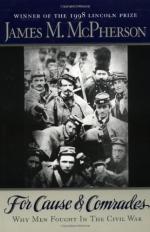
|
| Name: _________________________ | Period: ___________________ |
This test consists of 5 multiple choice questions, 5 short answer questions, and 10 short essay questions.
Multiple Choice Questions
1. At the end of "Chapter 7: On the Altar of My Country," McPherson says what percentage of the soldiers that comprised his sample material lost their lives in action?
(a) 21%.
(b) 94%.
(c) 14%.
(d) 48%.
2. When talking about the frustrations of Union soldiers in the last two years of the war, what amount do readers learn drafted men could pay to acquire a substitute?
(a) $300.
(b) $50.
(c) $150.
(d) $900.
3. After the discussion of the conflict between love of family and love of country, McPherson quotes an Alabama soldier as saying he worried for his wife if they failed. What was his wife's name?
(a) Annabelle.
(b) Mary.
(c) Cellie.
(d) Margaret.
4. After the battle of Antietam a soldier in the 21st Mississippi wrote his parents that he wanted to collect what Yankee body part for his sister, Anna?
(a) Scalps.
(b) Fingernails.
(c) Ear lobes.
(d) Bones.
5. In the spring of 1862, soldiers from which state felt a redoubled commitment to the war effort when large portions of their home state fell to the "insolent invader"?
(a) Tennessee.
(b) Mississippi.
(c) Maryland.
(d) Georgia.
Short Answer Questions
1. After discussing how the language of soldiers in letters home is cliche today, McPherson says that which writer noted that World War I made words like "glory" mock-heroic?
2. A forty year old captain of the 18th Massachusetts wrote his wife in August 1862 that he'd rather fight for years than for his sons to continue it. In what battle was he killed four months later?
3. After discussing Civil War soldiers' convictions, what commodity does McPherson say was most sought-after in camp, second to letters from home?
4. Right before the battle of Gettysburg, a lieutenant in the 53rd Georgia wrote to his wife, that Pennsylvania was the greatest country he'd ever seen; what was his wife's name?
5. After the burning at Chambersburg, what disease broke out in the prison camp at Charleston?
Short Essay Questions
1. Describe the information and political education level maintained by soldiers in "Chapter 7: On the Altar of My Country."
2. In the discussion of revenge, why does McPherson say that the Confederate army was more motivated by hatred and revenge than the Union?
3. In what way did the Confederate soldiers identify with the Founding Fathers in the discussion of the concept of liberty?
4. In "Chapter 9: Slavery Must be Cleaned Out," what convinced non-abolitionist Union soldiers that slavery was an evil that must be stopped?
5. What challenges did soldiers face in the last year of the Civil War that exacerbated their combat exhaustion?
6. Explain the phenomenon of "dry rot," as discussed in "Chapter 10: We Know That We Are Supported at Home."
7. In "Chapter 10: We Know That We are Supported at Home," why did some officers worry that married men made bad soldiers?
8. In Lincoln's discussions of democracy, what fear did he express if the South should be allowed to secede?
9. Explain the massacres of black soldiers, as discussed in "Chapter 11: Vengeance Will be Our Motto."
10. What can be considered ironic about the Confederate fascination with liberty, as discussed in "Chapter 8: The Cause of Liberty"?
|
This section contains 1,198 words (approx. 4 pages at 300 words per page) |

|




